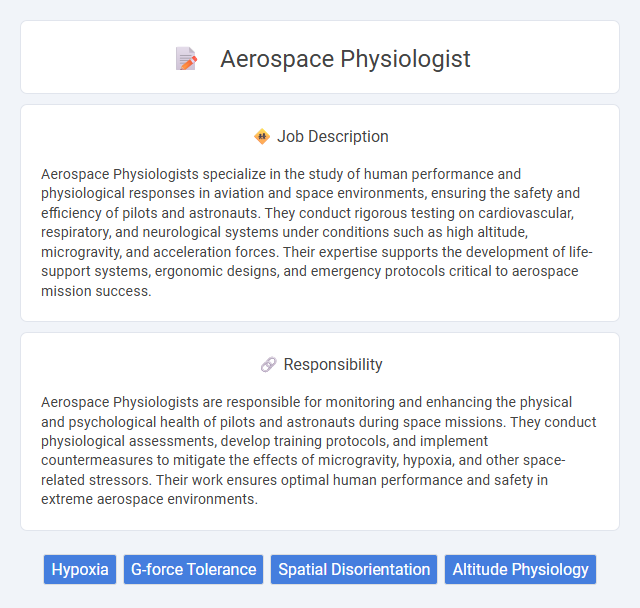
Aerospace Physiologists specialize in the study of human performance and physiological responses in aviation and space environments, ensuring the safety and efficiency of pilots and astronauts. They conduct rigorous testing on cardiovascular, respiratory, and neurological systems under conditions such as high altitude, microgravity, and acceleration forces. Their expertise supports the development of life-support systems, ergonomic designs, and emergency protocols critical to aerospace mission success.
People with a strong interest in human biology, physical fitness, and the effects of extreme environments may be suitable for a career as an aerospace physiologist. Those who handle stress well and have excellent problem-solving skills are likely to thrive in this role, given the demanding nature of studying human performance in aerospace settings. Individuals prone to anxiety or with limited resilience under pressure might find this job challenging.
Qualification
Aerospace Physiologists require a strong educational background in biology, physiology, or biomedical sciences, often holding a master's or doctoral degree specialized in aerospace medicine or human factors. Certifications such as the Certified Aerospace Physiologist (CAP) credential enhance job qualifications by demonstrating expertise in human performance and safety in flight environments. Practical experience with simulation technologies, flight suits, and hypobaric chambers is essential for effectively monitoring and optimizing astronaut and pilot health.
Responsibility
Aerospace Physiologists are responsible for monitoring and enhancing the physical and psychological health of pilots and astronauts during space missions. They conduct physiological assessments, develop training protocols, and implement countermeasures to mitigate the effects of microgravity, hypoxia, and other space-related stressors. Their work ensures optimal human performance and safety in extreme aerospace environments.
Benefit
Aerospace physiologists likely experience significant benefits such as contributing to human safety in aviation and space exploration. Their expertise in assessing human physiological responses to extreme environments could enhance mission success and crew well-being. Job stability and opportunities for research innovation may also be common advantages in this specialized field.
Challenge
Aerospace physiologists likely face significant challenges related to understanding the complex effects of extreme environments on human physiology. The role probably demands continuous adaptation to new research findings to improve safety and performance during spaceflight or high-altitude missions. Managing unpredictable physiological responses and developing mitigation strategies might be crucial aspects of this demanding career.
Career Advancement
Aerospace Physiologists specialize in human performance and safety in extreme flight environments, using expertise in physiology, aviation medicine, and aerospace technology. Career advancement opportunities include roles as senior researchers, flight surgeons, or directors of aerospace human factors programs within government agencies, defense contractors, or space exploration organizations. Professional growth often involves obtaining advanced certifications, conducting groundbreaking research, and contributing to the development of life support systems and astronaut training protocols.
Key Terms
Hypoxia
Aerospace physiologists specialize in studying the effects of hypoxia, a condition caused by insufficient oxygen supply, on pilots and aircrew members at high altitudes. They develop training programs and protocols to recognize early symptoms of hypoxia and implement countermeasures such as oxygen supplementation and altitude chamber simulations. Their expertise ensures the safety and performance of personnel operating in hypoxic environments encountered during flight and space missions.
G-force Tolerance
Aerospace physiologists specialize in monitoring and enhancing G-force tolerance, crucial for pilots and astronauts who experience high acceleration forces during flight and space missions. They develop training programs and use advanced simulation technologies to improve cardiovascular stability and prevent G-induced loss of consciousness (G-LOC). Their expertise ensures the human body's adaptation to extreme environments, enhancing safety and mission success in aerospace operations.
Spatial Disorientation
Aerospace physiologists specialize in understanding and mitigating spatial disorientation, a critical challenge affecting pilots and astronauts during flight and space missions. They employ advanced physiological monitoring and simulation technologies to analyze vestibular system responses and develop training protocols that enhance spatial awareness and safety. Their work directly contributes to reducing accidents caused by misperceived spatial orientation under high-G, zero-gravity, or complex motion environments.
Altitude Physiology
An Aerospace Physiologist specializing in altitude physiology studies the effects of high-altitude environments on human bodily functions, ensuring optimal performance and safety for pilots and astronauts. They conduct research on hypoxia, decompression sickness, and barometric pressure changes to develop training protocols and life support systems. Expertise in respiratory and cardiovascular responses at altitude, combined with advanced simulation technologies, is critical for mitigating risks during high-altitude flights and space missions.
 kuljobs.com
kuljobs.com